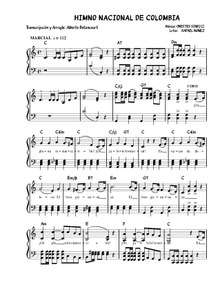National Anthem of Colombia
The "National Anthem of the Republic of Colombia" (Spanish: Himno Nacional de la República de Colombia) is the official name of the national anthem of Colombia. It is largely the creation of José Domingo Torres, an actor from Bogotá, who took a poem written by former Colombian president Rafael Núñez and asked a friend, Italian opera singer Oreste Sindici who migrated to Colombia, to set it to music.[1]
| English: National Anthem of the Republic of Colombia | |
|---|---|
 Front page of the sheet music to the National Anthem of Colombia. | |
National anthem of | |
| Lyrics | Rafael Núñez, 1887 |
| Music | Oreste Sindici, 1887 |
| Adopted | October 28, 1920 (de facto) 1995 (de jure) |
| Audio sample | |
"National anthem of Colombia" (instrumental)
| |
The official announcement of the song came in the form of Act 33 of 28 October 1920. The law 198 of 1995, which legislates national symbols, made mandatory for all radio and television in the country to broadcast the anthem both at 6:00 am and at 6:00 pm (the latter half, at various times for all free-to-air television channels), public addresses of the President of the Republic and other official events.
Lyrics
| Culture of Colombia |
|---|
 |
| Spanish lyrics | English translation |
|---|---|
| CORO DEL HIMNO |
CHORUS |
| ¡O, gloria inmarcesible! ¡O, júbilo inmortal! |
Oh, unwithering glory! |
| I | I |
| Cesó la horrible noche. La libertad sublime |
The dreadful night has ceased. |
| II | II |
| "¡Independencia!", grita el mundo americano. |
"Independence!" shouts |
| III | III |
| Del Orinoco el cauce se colma de despojos, |
The Orinoco's bed |
| IV | IV |
| A orillas del Caribe, hambriento un pueblo lucha, |
On the shores of the Caribbean, |
| V | V |
| De Boyacá en los campos, el genio de la gloria, |
From Boyacá in the fields, |
| VI | VI |
| Bolívar cruza el Ande que riegan dos océanos, |
Bolívar crosses the Andes |
| VII | VII |
| La trompa victoriosa en Ayacucho truena, |
The victorious trumpet |
| VIII | VIII |
| La virgen sus cabellos arranca en agonía |
In agony, the Virgin |
| IX | IX |
| La patria así se forma, termópilas brotando; |
Thus the motherland is formed, |
| X | X |
| Mas no es completa gloria vencer en la batalla, |
But it's not complete glory |
| XI | XI |
| Del hombre los derechos Nariño predicando, |
Of men the rights |
Instrumental introduction lyrics
During the border conflict with Peru (1932–1934), the soldiers who defended Colombia's national sovereignty added a new verse after the trumpet fanfare. Written specifically for that time of war, it soon fell into disuse.[3] The words are:
- Hoy que la madre patria se halla herida,
- Hoy que debemos todos combatir, combatir,
- Demos por ella nuestra vida
- Que morir por la patria no es morir, es vivir
- Now when the motherland is wounded,
- Now when we must all fight, fight,
- Let us give our life for her,
- Because to die for one's country is not to die but live.
According to José Antonio Amaya,[4] elementary school students in the 1930s were taught this stanza.
The final line is very similar to a line in the national anthem of Cuba that goes, "¡Que morir por la patria es vivir!"
Usage
The anthem should be played chorus-verse-chorus. Although the first verse is usually sung between choruses, any of the eleven verses may be used. The anthem should be played chorus-verse-chorus regardless of which verse is selected. This is how it is customarily performed in all public, political, and other important events both public and private.
However, it is not uncommon for only the chorus and verse to be played without repeating the chorus. This is usually the case when brevity is sought. By law, radio and television broadcasts must play the national anthem at 6:00 am and 6:00 pm, and the radio invariably uses the shorter format. The shorter anthem is also used at international events such as the Olympic Games or World Cup.
In ceremonies of the Colombian Artillery, the last verse is used instead of the first verse. The Colombian Cavalry traditionally uses the sixth verse, while the 4th verse is used by the Colombian Navy.
References
- "Colombia". nationalanthems.info. Retrieved 2020-04-03.
- Some versions give "El pueblo es soberano" ("People are sovereign")
- Eduardo Galeano y Don Quijote de la Mancha
- Tiempo, Casa Editorial El. "UNA INICIATIVA NORTESANTANDEREANA Buscan meter al general Santander en el Himno". El Tiempo (in Spanish). Retrieved 2017-04-19.